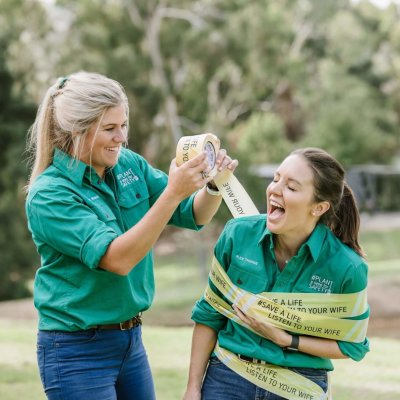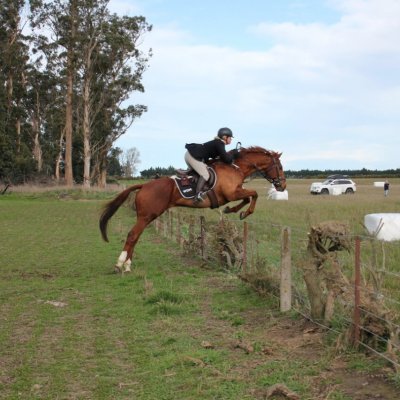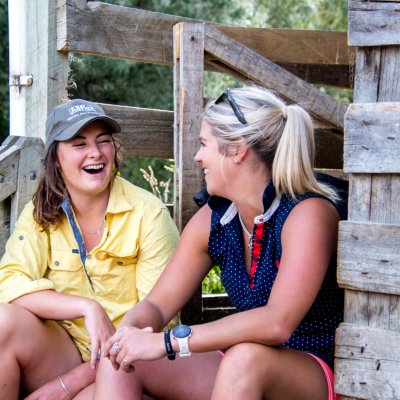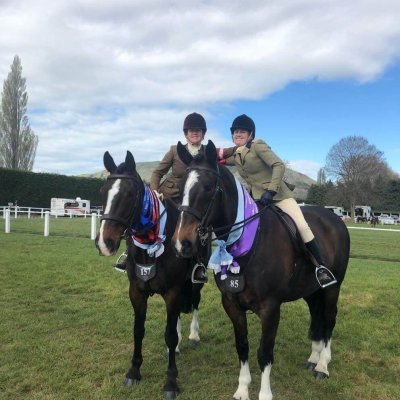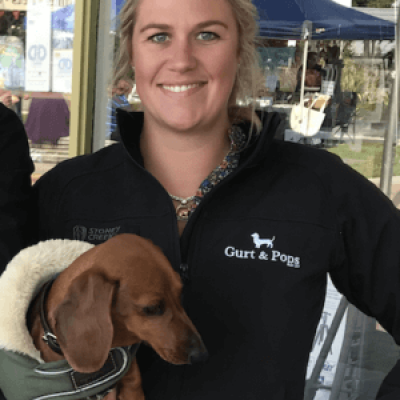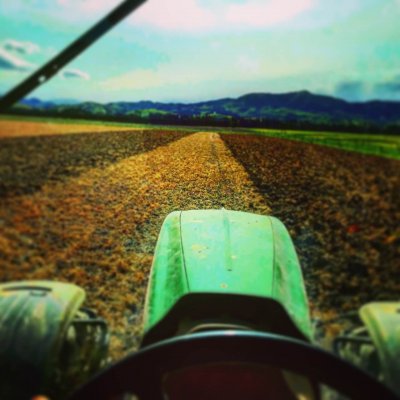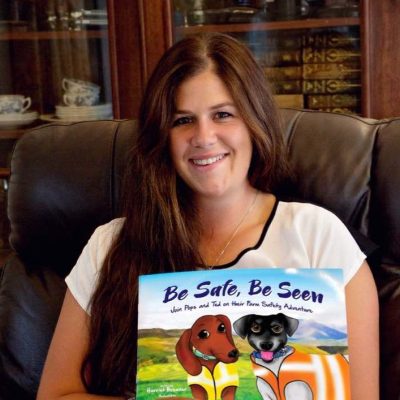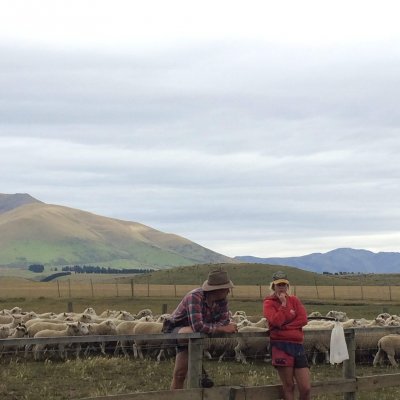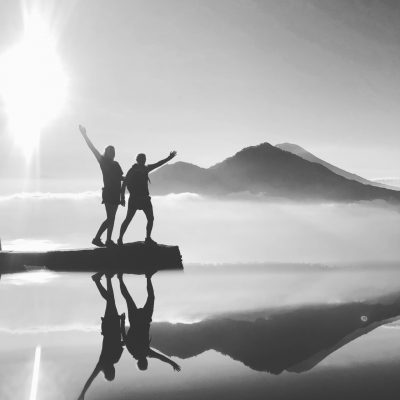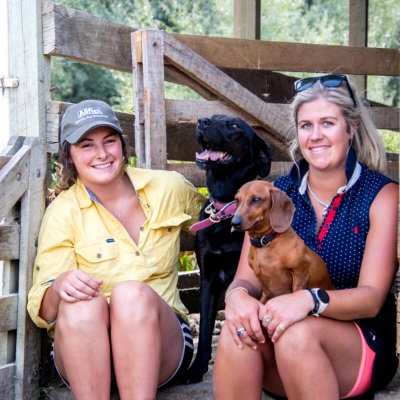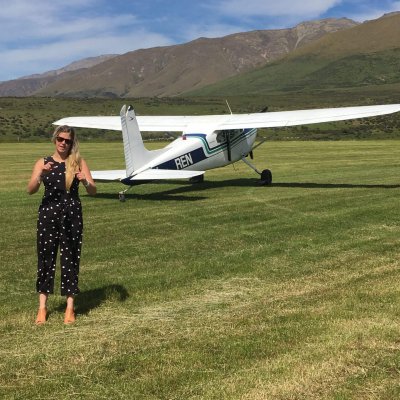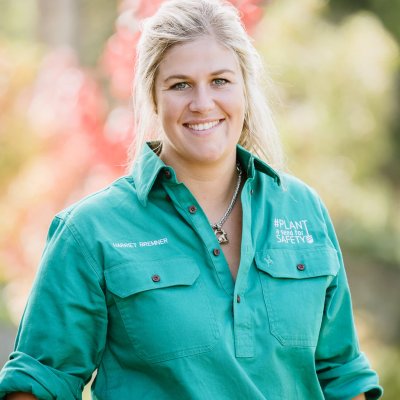Raised on a sheep and beef farm on the South Island’s Banks Peninsula, Harriet has always felt a connection with water, hills and farming. Currently residing in South Canterbury, Harriet finds herself following a new life journey as a children’s book author and campaigner for improved health, safety and wellbeing in rural industries.
Upon losing her partner to a farming-related incident in 2017, Harriet started following her dreams of writing. She has since released three books for rural children. Founder of Gurt and Pops, Harriet’s first book Bob ‘n’ Pops is a memorial story based on the true friendship between a southern man and his miniature dachshund. Harriet’s second book Be Safe, Be Seen highlights the importance of practical conversations between adults and their children to stay safe on the farm. Use Your Voice, Harriet’s third book, teaches children self-help strategies when it comes to their wellbeing.
When asked what concerned Harriet about the health and safety of those in rural industries and communities, Harriet highlighted the challenges associated with the traditional mindset of farmers that ‘it will never happen to me’. In reality, an incident can happen to anyone – even the most experienced of operators. Harriet reinforced the importance of taking a practical approach to health and safety, making good decisions and ensuring that getting home to your family at the end of each day remains a priority.
How would you describe yourself in three words?
Authentic, a deep thinker and caring.
Tell me something interesting about yourself...
I grew up on a sheep and beef farm on Banks Peninsula. I had an incredible childhood, we always had fresh crayfish in the laundry sink that Dad had dove for, rode our ponies around the farm, and would go out before and after school every day during lambing to help Dad mark his Polwarth Stud lambs. I was sent to boarding school at the age of 10 due to being isolated, and to avoid Mum having to do a lot of driving in and out of a windy road each day. We were lucky though, as we got to go home every weekend. Since then, we’ve moved a few times and Mum, Dad and my brother are now farming in North Canterbury, grazing dairy cows in the wintertime.
In my 20’s, after gaining my full teaching registration I moved down south to the Hakataramea Valley to live with my long–term partner James. I managed to get a teaching job at the local school, becoming a teacher of the deaf and the Reading Recovery Specialist Teacher. I absolutely loved the Haka. Wide-open spaces, vast paddocks, clean air and its very own micro-climate. It’s very hot in the summer and very cold in the winter, but it’s a dry cold which is the best! I was out on the farm with James any chance I could be. It was my favourite time hanging out with him, the animals and our sausage dog, Poppy. The farm included sheep, beef and cropping – so busy all year round. During the winter I also hunted horses with my hunt club. Every Saturday we met at a different farming property in the area and headed out with a pack of hounds jumping fences and having a good gallop. Hunting is my favourite hobby and I was so lucky to live in an area where it was easily accessible. Living in the Haka you have access to game hunting, boating, skiing, riding and so much more.
I had only just cut down my teaching days to 4 days per week so that I could have more time on the farm with James when he passed away in a farming-related incident. We had so many plans together and this completely changed every single thing in my life. I had always dreamed of writing a children’s book so over a cup of tea one day I wrote ‘Bob ‘n’ Pops’. The true story of an unlikely friendship between a southern man and his miniature dachshund. ‘Bob ‘n’ Pops’ is a memorial book about friendship, and is something I’d hoped friends and family would buy to keep the memory of James alive for years to come. While my book was being illustrated, I ended up in the UK for a few months working and riding horses for Zara Phillips, which was an incredible experience! As I am self-published, I sold my book pre-sale on the internet since I had zero dollars in my business account and the sales allowed me to actually physically print the book.
Fast forward 2.5 years and I continue to help Mum and Dad on the farm and have since published my second book about farm safety called Be Safe, Be Seen. In this book, Poppy teaches Ted (a mini–foxy) how to use his ‘Think Safe Brain’ when he is out and about on the farm. Ted learns that it’s not enough to just pop on a high–vis vest and then still act like an idiot, as you can still get hurt. He learns that you have to make good decisions when out on the farm in order to get home safely.
There is also a place for adults to discuss things like what a ‘blind spot’ is. I want adults to have practical conversations with their children about farm safety because at the end of the day, if we don’t make good decisions we can be seriously hurt or even killed. I’ve recently made the very hard decision to leave teaching for now as my grief, of which I’ve been running away from for the past 2.5 years, has finally caught up with me and I’m ready to admit that I’ve not been ok for some time. It’s so easy to fall into the trap of looking ok and mustering onwards because ‘that’s what we do’. I am now following my dream of writing, selling my books to educate and inform adults and children and am also starting to speak publicly about this massive issue we have in NZ of practical and intelligent people having preventable incidents at work.
My latest book ‘Use Your Voice’ won the Like Minds, Like Mine Creative Grant in 2019 which is supported by the Mental Health Foundation of New Zealand. This story was something that I wrote when I was finally willing to see that I needed to use my voice to tell the people I loved that I was not ok. I realised that it is ‘ok to be not ok’ but a lot of the time we hide how we are truly feeling because it can make others around you feel uncomfortable or society expects us to walk out our door each day and be ‘fine’. This story for children helps parents teach them self-help strategies when it comes to their wellbeing. Teamed up with Will To Live this exciting project is also supported by Farmstrong and Rural Support Trust. I cannot wait to see where this journey takes me.
I also want to talk publicly about grief and resilience and how we measure success based on ourselves and not what society expects of us. Another project coming up is looking at targeting mental health and wellbeing in our school children and starting to change the strong culture of not talking about ourselves and our feelings. I believe that if we want to change the norm and furthermore the ‘culture’ then we need to start with our children so they grow up knowing that things like crying when you are sad is ok and that talking to someone you trust is an important and natural thing to do. We need to open our doors to this and realise that it won’t change until we change. So currently my plans have changed, and I am doing my best to just do me! I have just started a part time job working for Safer Farms, a non-profit organisation who are part of the action towards making farm health, safety and wellbeing, something that is part of our everyday farming operations. It is exciting where these opportunities are heading and I cannot thank my family and friends who have supported me on this pathway enough!
What's one achievement you are most proud of?
I am most proud of standing up and saying that I am not ok, that I have not been happy and that I have dreams and aspirations that I want to follow. This has been so hard, and yet the most refreshing thing I have ever done. I am also proud that James’s memory is living on through his memorial book and that he is being talked about by children everywhere.
What makes you truly happy?
The things that make me truly happy are my dog Poppy, family, friends, galloping up a hill on my horse to sit there and take in the scenery, hunting, living in rural NZ and a good gin!
What do you love the most about being a rural woman?
I love the wide-open spaces, the freedom to ride your horse to the local pub to get a takeaway coffee and the ability to be out of reach from the city and people. When I travel overseas it never ceases to amaze me how truly lucky we are to live in such an incredible country. I get to meet friends at the beach to ride our horses, followed by pizza in the local town and have access to rivers, lakes, mountains and the ocean – all in one! I love being surrounded by people who love being rural too, who love their animals and the land and everything that goes with it.
Tell me about a time when you felt worried about your own or someone else’s health, safety or wellbeing on the farm, boat or in some other aspect of rural life.
I have felt worried when I’ve had people tell me stories about ‘shit that was close’ moments and hearing people laughing about these over a beer at the pub, thinking it is funny. This close call is so close to ending their life yet they think it was a joke. It concerns me that we have this ‘she’ll be right’ and ‘it’ll never happen to me’ attitude in rural NZ. The thing is that it can happen to anyone, even the most experienced operators.
What practical things did or could you, your partner and / or others do to prevent someone from getting hurt?
Treat farm machinery with the same respect as a loaded fire-arm. Both have the same potential outcome so having conversations about the work that you are about to do is always important. Making sure that whoever is doing a job has the knowledge to carry it out safely. Conversations are key. Listen to people if they tell you they are worried about something and don’t force them to do something they are not comfortable with. Make the environment that you work in a safe place where everyone feels as though they can express how they are feeling without judgement.
"We need to educate the future generation of farmers on how to make good, safe decisions. People should always come first - so treat farm machinery with the same respect as a loaded fire-arm."
Harriet Bremner, Fairlie, Canterbury NZ Tweet this
Is there a time, place or scenario when your partner / workers are more willing to make changes to the way work is done?
I think that we need to make sure we are learning from people’s close calls. What made it happen in the first place…was it lack of sleep, stress, rushing, pressure or was it something else? Use times like smoko to have these chats where people feel relaxed and more open to sharing a story. Storytelling is key to learning something new.
If you could give any advice to another rural woman about work health and safety in rural industries, about influencing change in business - or just in general - what would it be?
My advice is not to make health and safety a chore. It needs to be addressed in a practical way to practical people. They need to be reminded that it is the hundreds of decisions that they make every day that affect the outcome of a situation. They need to be told the reality about making certain decisions, and see what it actually impacts if something bad happens to them. They need to understand that there is always another day to get something done, and just how important sleep, a good diet and exercise is. They need to make it a positive subject that is regularly talked about not something that is discussed because the health and safety officer is coming to check on things. We need to educate the future generation of farmers on how to make good, safe decisions. Nothing is worth your life and someone is not going to be able to achieve their dreams and goals if they are gone, so let us remind them that their decisions in any given moment affect everything in the lives of those who they leave behind.
Is there anything else you'd like to add?
People should always come first.
